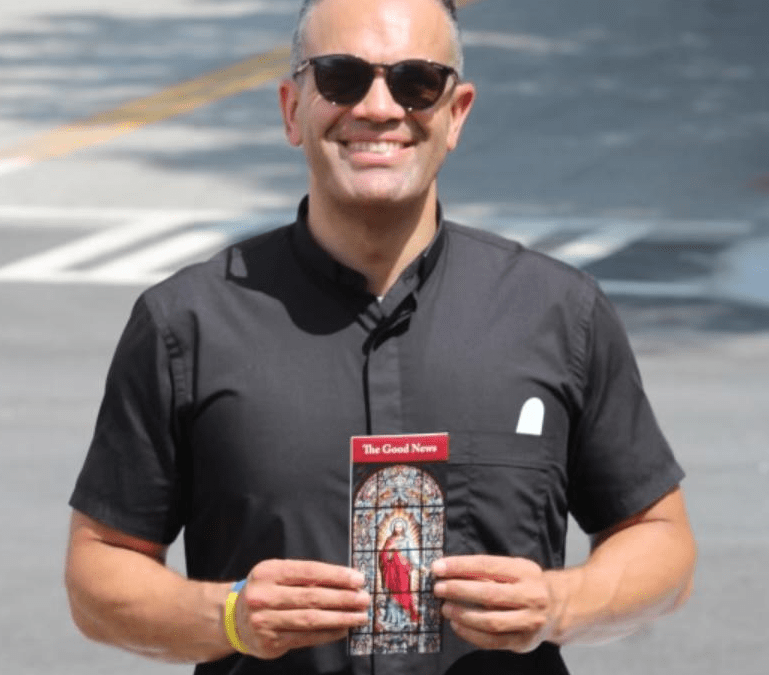Douglasville, GA
Click here to find a team or start one of your own!
This report is a continuation of yesterday’s story and comes to us from team leader Jeremy with our team in Douglasville, GA:
We setup a table at our local Fourth of July parade. Soon after the parade, a different evangelism group set up a speaker across the street from us and started preaching and handing out tracts. While I was engaged in an in-depth conversation with a young man named Ernie, who was asking me all kinds of challenging theological questions (I discovered later that he was part of the group, and was pretending to be interested), someone from this group approached our table and got into a hostile conversation with my team members, including our parish priest. I heard him scoff, “You are teaching the traditions of men,” as he walked away.
I walked across the street to introduce myself and find out where they were from. They were from a local Baptist church that I was familiar with. My intention was to build a bridge with them and encourage them in what they were doing, so I praised the church’s sports ministry and pastor. They were friendly, but when I explained my background as a Protestant evangelist and how my Gospel presentation as a Catholic is essentially the same, they started hounding me with objections and questions (I was not looking for a debate with them!). Knowing that this was going nowhere, I asked the young scoffer, “Are you open to the possibility that you misunderstand what Catholics believe and do?” He said, “No, because I have the Holy Spirit and I can clearly see that your practices are offensive to Jesus.” I rebuked him for the arrogance of this position, and walked back to our table.
Later, as the crowd had thinned, one of them walked over to engage us. He was friendly enough. I gave him our Gospel tract and asked him to look over it and tell me if he found anything in it that made it a “different Gospel” as they claimed the Catholic Church teaches. He could not, of course, but then went on to accuse us of being idolaters and urged us to “trust in Christ alone for our salvation.” I challenged him that he was imposing his own misinformed perspective on Catholics to judge what we do and that he should seek to understand from our own perspective. Lacking any sort of self-awareness that he even has a perspective, he said “I’m just telling you WHAT IS.”
When I shared that the hostility does not go both ways, but that I would be sincerely glad if an unbeliever believed in Christ because of them and was baptized in their church, he argued that I shouldn’t be because the Council of Trent anathematized those who teach “justification by faith alone.” I said he misunderstood what that meant. In other words, he wanted to insist that I should believe he was condemned and that I was going against the teachings of the Church!
From their perspective, our Gospel is ‘different’ because we don’t believe in JFA. I challenged him to show me in the Bible a verse that defines JFA. He read verses about grace, faith, and salvation, but I pointed out that none of these used that word, and he was reading JFA into it: “I’m not trying to convince you to believe what we do about justification, but you can’t make your view of it the essence of the Gospel.”
As we packed up, he asked me if it was worth the risk of being wrong (meaning that we actually were idolaters and God would judge me for that). I said, “I’d rather trust a 2,000 year old Church’s interpretation of the Bible than my own interpretation and that of your less than 300 year old tradition.”

